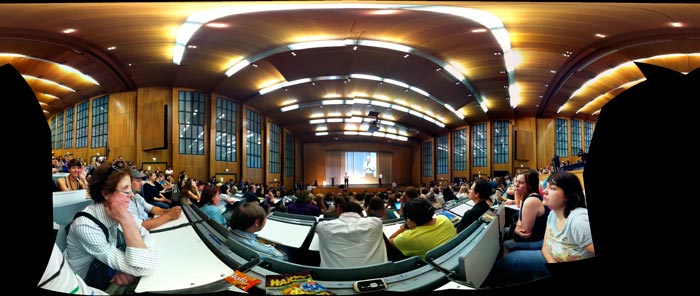
click to enlarge (this one only)
What the photostitching software did to Chomsky’s audience (details of the photo above):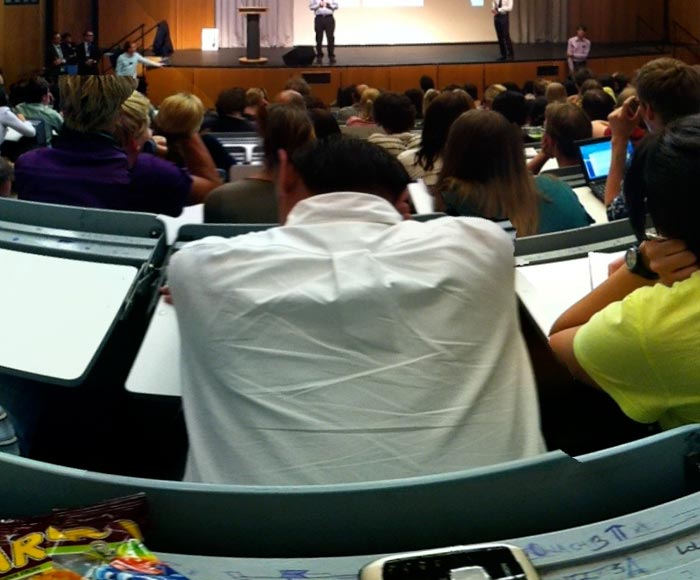
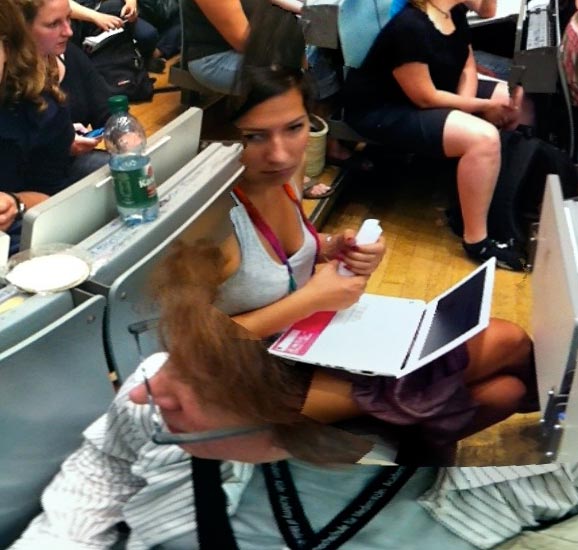
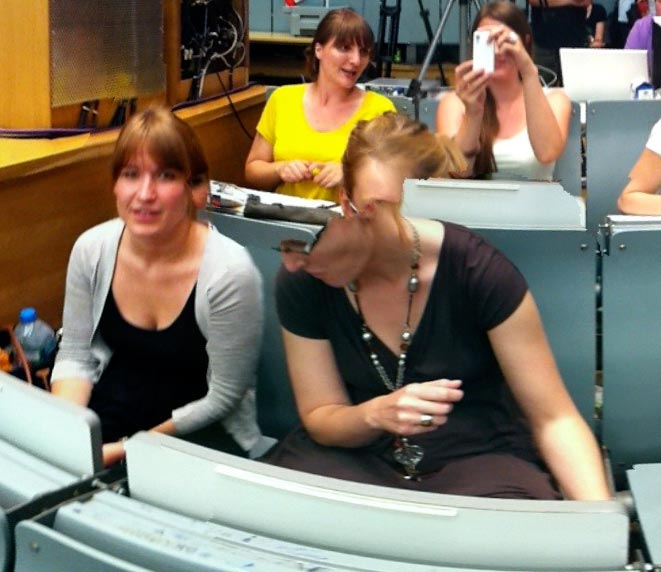
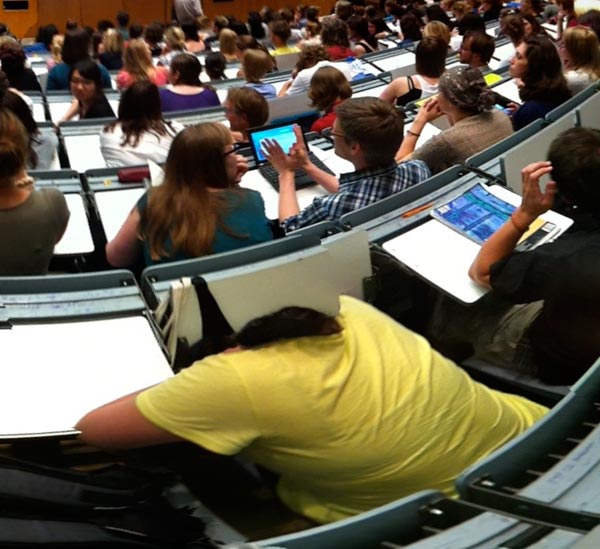
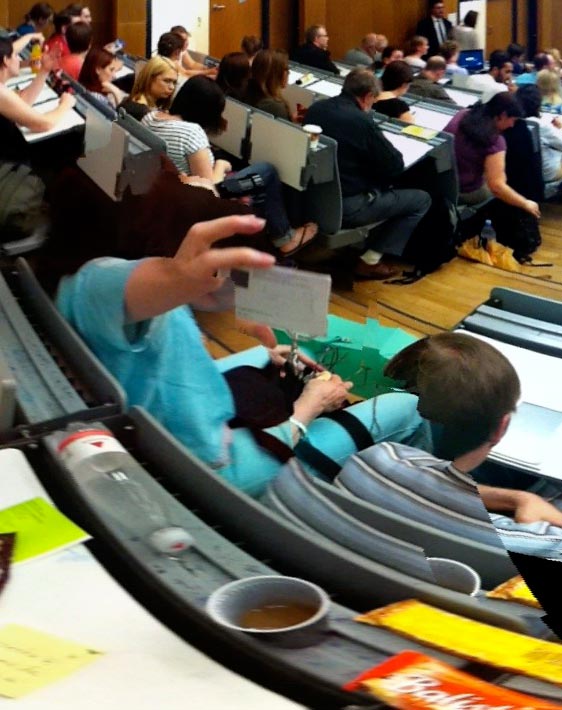
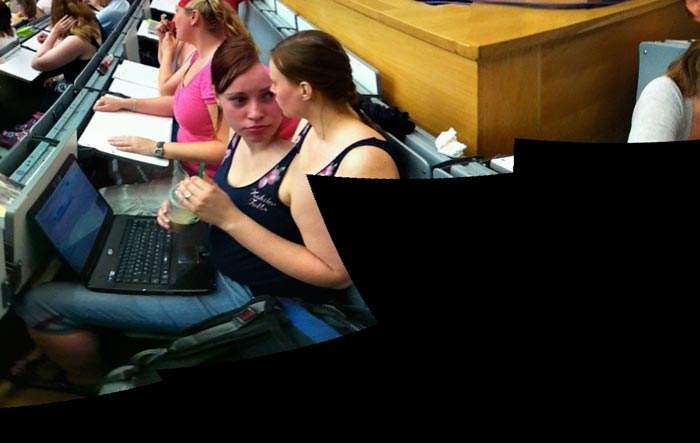
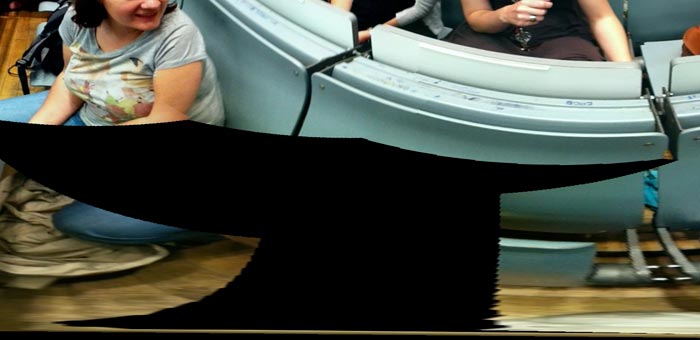

 Mindshare LA is a unique monthly eventwhich draws a brilliant crowd seekingconnections, experiences and exposureto new ideas. Over the past three yearsa zealous following has developedaround what can only be describedas ‘Enlightened Debauchery’…
Mindshare LA is a unique monthly eventwhich draws a brilliant crowd seekingconnections, experiences and exposureto new ideas. Over the past three yearsa zealous following has developedaround what can only be describedas ‘Enlightened Debauchery’…
 May 18th register
May 18th register
June 7th SAG will be attending the Noam Chomsky lecture at the Uni Köln:
Albertus-Magnus-Professor Noam Chomsky is going to give his 2nd public lecture: »The Evolving Global Order: Prospects and Opportunities.«
When:
Di 7. Jun. 17:30 – 19:00 GMT (keine Sommerzeit)
Where:
Aula (1 & 2) der Universität (Hauptgebäude)
Vom 6.-8. Juni 2011 wird der bekannte amerikanische Philosoph Noam Chomsky als Albertus-Magnus-Professor 2011 drei öffentliche Vorlesungen und zwei Seminare an der Universität zu Köln halten. Die Albertus-Magnus-Professur wurde an der Universität zu Köln im Gedenken an den mittelalterlichen Universalgelehrten Albertus Magnus (1193 bis 1280) eingerichtet, der von 1248 bis 1254 in Köln am Generalstudium der Dominikaner lehrte. Auf diese Professur wird eine Persönlichkeit von internationaler Geltung berufen, die in öffentlichen Vorlesungen und Seminaren Fragen von allgemeiner Bedeutung behandelt, die derzeit in vielen Grundlagenwissenschaften, aber auch in der öffentlichen Debatte eine Rolle spielen.
Nach Arthur C. Danto (2005), Jean-Luc Nancy (2006), Giorgio Agamben (2007) und Robert Audi (2008), Philip Pettit (2009), Enrique Dussel (2010) hat nun Noam Chomsky die Einladung auf Albertus-Magnus-Professur angenommen.
Avram Noam Chomsky, 1928 in Philadelphia (Pensylvania, USA) geboren, lehrt seit 1961 als Professor für Linguistik am Massachusetts Institute of Technology (MIT). Durch seine linguistischen und sprachphilosophischen Arbeiten von paradigmatischer Bedeutung und aufgrund seines politischen Engagements zählt Noam Chomsky zu den herausragenden Intellektuellen der Gegenwart, dessen Schriften ebenso wie seine öffentlichen Interventionen eine weltweite Aufmerksamkeit und Rezeption erfahren haben.
“Ein Intellektueller zu sein, ist eine Berufung für jedermann: es bedeutet, den eigenen Verstand zu gebrauchen, um Angelegenheiten voranzubringen, die für die Menschheit wichtig sind. Einige Leute sind privilegiert, mächtig und gewöhnlich konformistisch genug, um ihren Weg in die Öffentlichkeit zu nehmen. Das macht sie keineswegs intellektueller als einen Taxifahrer, der zufällig über die gleichen Dinge nachdenkt und das möglicherweise klüger und weniger oberflächlich als sie. Denn das ist eine Frage der Macht.” (Noam Chomsky)
wichtige Veröffentlichungen (in Auswahl): ▪ Aspects of the Theory of Syntax. 1965. ▪ Language and Mind. 1968, 2007; dt. Sprache und Geist. 1999. ▪ Rules and Representations. 1980, 2005; dt. Regeln und Repräsentationen. 1981. ▪ The Minimalist Program. 1995 ▪ On nature and language. 2002. ▪ Language and problems of knowledge. 2003. ▪ Government in the Future. 2005; dt. Die Zukunft des Staates. 2005. ▪ The Chomsky-Foucault debate : on human nature. 2006. ▪ Interventions. 2007; dt. Interventionen. 2008. ▪ Die Verantwortlichkeit der Intellektuellen. Zentrale Schriften zur Politik. 2008.
“Whether you agree or disagree with what you will hear, we feel that none will deny the right of these views to be broadcast.”
Mike Wallace rose to prominence in 1956 with the New York City television interview program, Night-Beat, which soon developed into the nationally televised prime-time program, The Mike Wallace Interview. Well prepared with extensive research, Wallace asked probing questions of guests framed in tight close-ups. The result was a series of compelling and revealing interviews with some of the most interesting and important people of the day.
The Mike Wallace Interview ran from 1957 to 1960, but the Ransom Center collection includes interviews from only 1957 and 1958. In the early 1960s, Mr. Wallace donated to the Ransom Center kinescopes of these programs and related materials, including his prepared questions, research material, and correspondence.
Copyright of all of the interviews is held by Mike Wallace, who generously agreed to allow the Ransom Center to present them here in their entirety. Any further use of this material requires the permission of both Mike Wallace and the Ransom Center.
http://www.hrc.utexas.edu/collections/film/holdings/wallace/
An Exhibition of Radical Speech Acts
October 30–November 9, 2010
Opening Reception:
November 1, 2010, 6:00 – 8:00 pm
Arnold and Sheila Aronson Galleries
The Sheila C. Johnson Design Center
Parsons The New School for Design
http://www.newschool.edu/sjdc
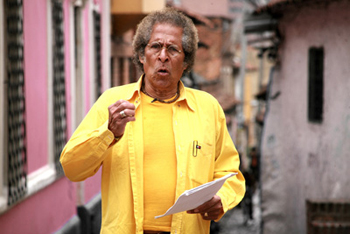
The exhibition presents the work of fifteen artists and collectives who explore the relationship between language and power, media, action, and socio-political context through gallery works, talks, workshops and performances. The exhibition takes its name from the title of a groundbreaking treatise by British philosopher J.L. Austin, who eloquently presented the concept of speech acts. He disavowed the notion of language as something passive that simply describes reality, but rather described it as a set of practices that can be used to affect and create realities. Austin’s premise is that speaking itself contains the power of doing.
Participating artists include Melanie Crean; Azin Feizabadi and Kaya Behkalam; Andrea Geyerand Sharon Hayes; Yael Kanarek; Carlos Motta; Martha Rosler; the Iraqi/U.S. Cross Wire Collective; Mark Tribe; and The Yes Men. Artists presenting talks and performances include Wafaa Bilal; Feizabadi; Kanarek; Huong Ngo and Hong-An Truong; Tribe; and Mary Walling Blackburn.
Several pieces in the show relate speech to the urgency of the political process during an election season. Carlos Motta’s Six Acts: An Experiment in Narrative Justice (2010) reenacts a series of speeches concerning the concept of peace, originally delivered by six liberal Colombian presidential candidates from the last century who were assassinated because of their ideology. Performed by actors in public squares in Bogota during the last presidential campaign, the work emphasizes the transformative potential of fiction as a tool of reparative collective memory. Azin Feizabadi’s The Epic of the Lovers: God, Mafia and the Citizens (2009) muses on the disparity between individual and collective desire for change during Iran’s Green movement, written and photographed by the artist as he participated in the protests in Tehran. Melanie Crean’s The Anonymous Archives (2008-10), is an online archive of interviews that document the rapid shifts in Iraqi and American desire for pol itical change during the period of US military divestment, beginning before the 2008 election of President Obama, and finishing just after the current US mid-term elections.
06 April 2011 opening course description + demo of smartboard
13 April 2011 Christopher Csikszentmihalyi’s talk and student work review.
20 April 2011 Daniela Kinateder’s talk “Panopticon LV I-I”
05 and 06 May 2011 field trip to Hamburg for talks and exhibition
16 May 2011 Martha Rosler visiting the seminar
17 May 2011 discussion, Martha Rosler and scheduled student presentations
18 May 2011 seminar scheduled students’ presentations
24 May 2011 Susanna Schoenberg “Some Basics on Telecommunication and Multivariante Data Analysis (while cooking Italian)”
25 May 2011 seminar lecture + students’ presentations (mid term review)
01 June 2011 Karin Harrasser and Aino Korvensyrjä: lecture
1 Der Heilige Berg: Leni Riefensthal as a dance performer ().
2 Triumph of the Will (photos from Hinter den Kulissen des Parteitags): as a director and editor of documentaries.
3 Her paperwork performance in getting the rights to revenue from TOW after WWII.
4 The focus on (enigma of) her is the depth and duration of denial in her life. And her set-ups of watching and being watched.
interviews & performances on video @KHM mediathek:
Abramovic – Ulay / Regie: Marina Abramovic und Ulay . – Amsterdam : MonteVideo . – 10 Videokassetten (VHS) : farb.
Zaugg, Remy [Regie] : Positive zero . – Originalfassung . – 1 Videokassette (VHS, 34 Min.) : farb. . – (Modus vivendi ; 2,2 )5 ;
Sign.: VID V 1261 Znr.: 98 V 249,2
Coulibeuf, Pierre [Regie] : The Star – Marina Abramovic / Regie: Pierre Coulibeuf. Drehbuch: Marina Abramovic … . – 1 (VHS, 60 Min.) : farb.
Sign.: VID TV 1475 Znr.: 99 TV 30
Art meets science and spirituality in a changing economy
Abramovic, Marina : / Marina Abramovic (art), Fritjof Capra (science), Raimon Panikkar (spirituality) . – 1 Videokassette (VHS, ca. 45 Min.) : farb. 5 ;
Sign.: VID V 0267 Znr.: 92 V 225
Abramovic – Ulay / Regie: Marina Abramovic und Ulay . – Amsterdam : MonteVideo . – 10 Videokassetten (VHS) : farb.
China ring, unedited video notebook . – Originalfassung . – 1 Videokassette (VHS, 159 Min.) : farb., teilw. s/w . – (Continental videoseries ; 3,2 )7 ;
Sign.: VID V 1263 Znr.: 98 V 250,2
Abramovic – Ulay / Regie: Marina Abramovic und Ulay . – Amsterdam : MonteVideo . – 10 Videokassetten (VHS) : farb.
Action in 14 predetermined sequences . – Originalfassung . – 1 Videokassette (VHS, 30 Min.) : s/w . – (A performance anthology ; 1,2 )2 ;
Sign.: VID V 1258 Znr.: 98 V 248,2
A performance anthology : (1975 – 1980) / Regie: Marina Abramovic und Ulay . – Amsterdam : MonteVideo . – 3 Videokassetten (VHS) : farb. . – (Abramovic – Ulay ; 1 )
Four performances by Abramovic (1975 – 1976) . – Originalfassung , [S.a.] . – 1 Videokassette (VHS, 60 Min.) : s/w . – (Abramovic – Ulay ; 1 )1,1 ;
Sign.: VID V 1257 Znr.: 03 V 52
Abramovic – Ulay / Regie: Marina Abramovic und Ulay . – Amsterdam : MonteVideo . – 10 Videokassetten (VHS) : farb.
Communist body / fascist body . – Originalfassung . – 1 Videokassette (VHS, 154 Min.) : farb. . – (Modus vivendi ; 2,1 )4 ;
Sign.: VID V 1260 Znr.: 98 V 249,1